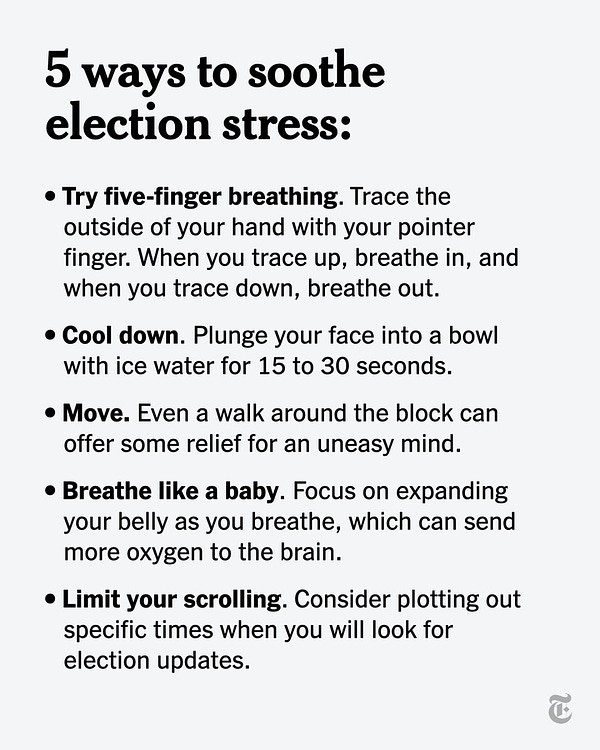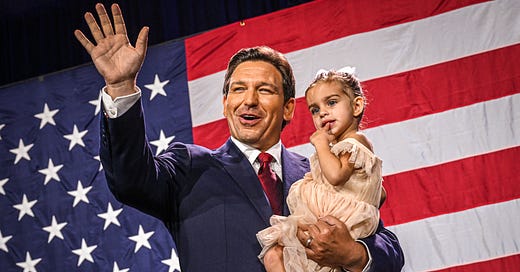
Early on Tuesday evening, The New York Times posted an item for its readers called Five Ways to Soothe Election Stress:


(Yes, we checked, and it is indeed real.)
It urged anxious readers bracing for the widely predicted Republican romp to “plunge your face into a bowl with ice water for 15-30 seconds.” Or, if that didn’t work, perhaps “breathe like a baby.” Or maybe “try five finger breathing.” (I googled that last one.)
But by Wednesday morning, conservatives and Republicans were the ones huddled under their weighted blankets downloading meditation apps.
For weeks, pundits and pollsters on the left and right had predicted a red wave, even a red tsunami. Some were predicting Republicans would gain 30 to 35 House seats. But that red wave turned out to be little more than a ripple.
Why?
Think about the context as Americans headed to their polling places on Tuesday: A president, Joe Biden, with an approval rating of 41%. The worst crime wave in decades. The worst inflation in more than 40 years. Americans in poll after poll, expressing deep dissatisfaction with the direction of the country after a pandemic that crippled it.
And still, while neither the House nor the Senate has been called, Republicans are expected to pick up a total of seven seats in the House, giving them far weaker control than polls predicted. The Senate looks likely to come down to a December runoff in Georgia. And governor's mansions across the country are occupied by about as many Democrats as Republicans.
So why did Republicans perform so badly?
Here’s one theory: Trump.
Trump is poison. Trump lost in 2020 and on Tuesday night he helped lose at least 23 elections.
Think of the candidates Trump endorsed:
Dr. Mehmet Oz. Oz was handpicked by Trump for the Pennsylvania Senate race over David McCormick, a West Point graduate who served in the Gulf War. It’s not as if McCormick, a hedge funder, was anti-Trump; his wife, Dina Powell, was Trump’s deputy national security adviser. But he did condemn the January 6 storming of the Capitol, so Trump endorsed Oz—who ran against John Fetterman, the lieutenant governor of the state who had a stroke in May and could barely make it through the single debate he agreed to. And still won.
Doug Mastriano. The Pennsylvania gubernatorial candidate was endorsed by Trump (and in league with the antisemites over at Gab). He lost his race for governor to the moderate Democrat Josh Shapiro by 13 percent and a whopping 600,000 votes.
Don Bolduc. Bolduc—who claimed during the primary that Trump had won the 2020 election before later reversing his position—ran against incumbent Maggie Hassan for a New Hampshire Senate seat, but lost to Hassan 53 percent to 45 percent.
John Gibbs. Trump denounced the incumbent in Michigan’s 3rd congressional district, Peter Meijer, the only Republican freshman who voted to impeach him over January 6. Then, the Democratic Congressional Campaign Committee doubled down by funding John Gibbs, Meijer’s MAGA challenger, who lost on Tuesday by 13 points to Hillary Scholten—who turned the seat Democratic for the first time in nearly 50 years.
Tudor Dixon, who ran for governor of Michigan, was endorsed by Trump and said his election was stolen. She lost on Tuesday night to Gretchen Whitmer, the incumbent who called women “people with periods” in a recent TikTok video and had been roundly criticized for her handling of Covid.
Then there is Herschel Walker, who Trump endorsed, apparently unconcerned about Walker's history of domestic violence, child neglect, and the question of Walker’s basic competence. (Walker’s thoughts on the Green New Deal: “So what we do is we’re going to put, from the ‘Green New Deal,’ millions or billions of dollars cleaning our good air up. So all of a sudden China and India ain’t putting nothing in there—cleaning that situation up. So all with that bad air, it’s still there. But since we don’t control the air, our good air decide to float over to China, bad air.”) The race was so close—a difference of just over 35,000 votes—that it’s headed to a runoff.
Kari Lake was meant to be the new GOP star, and she sang right from Trump’s hymnal on the 2020 election. Her gubernatorial race in Arizona is also too close to call, but she’s 13,000 votes behind Katie Hobbs—the unpopular Democratic secretary of state, who refused to debate Lake—with 70 percent of ballots counted. (It’s impossible to say with certainty who’s going to win. But it’s noteworthy that Maricopa County—by far, the biggest county in Arizona, which Trump lost by two points in 2020—has yet to be counted. What technology does Florida have that Arizona lacks?)
The other big race in Arizona was the Senate contest, in which astronaut Mark Kelly leads Trump-endorsed Blake Masters by nearly 100,000 votes. Masters was backed by Peter Thiel and received assistance from Trump's super PAC—at least $1.8 million—after Mitch McConnell's Leadership Fund cut spending in Arizona to divert resources elsewhere.
Now, think about the candidates Trump trashed.
Brian Kemp ended his race for the governorship 300,000 votes ahead of his Democratic opponent Stacey Abrams despite the fact that Trump called Kemp, "a complete and total disaster" and funneled millions to a Kemp primary challenger. Kemp had earned Trump's hatred by refusing Trump's entreaties to throw the 2020 election. So for good measure, the president insisted at a rally that Abrams would be a better governor.
Meanwhile, Chris Sununu, New Hampshire’s incumbent Republican governor—who Trump couldn’t stand—won by 16 points. At a Washington bash in April, Sununu said of Trump: “He’s fucking crazy!”
Who can argue?
It appears that one of the lessons of this cycle is telling your voters not to vote and that our elections are “rigged” won't help your party at the polls.
In the runup to the midterms, the former president, as always, prioritized himself, teasing the press with the idea that he was about to announce his own candidacy. He raised some $100 million for his SuperPAC in 2020 but spent, according to NBC, a measly $16 million on candidates. Trump spent election night—shocker—focusing on himself. He unleashed on his social media site, Truth Social, celebrating the defeat of Joe O’Dea, a Senate candidate who criticized him, among other jewels.
By Wednesday, he had moved on to negging Ron DeSantis—the only Republican who actually delivered the promised red wave, winning Florida by a massive 20 points, and who is currently dealing with a hurricane. (And is the biggest stumbling block separating Trump from the GOP presidential nomination in 2024.)
Here’s a second lesson: When abortion is on the ballot, it matters.
In the aftermath of the Dobbs decision in May, which repealed Roe v. Wade and rescinded national abortion rights, there were all kinds of predictions that abortion would drive this election—maybe even determine it. Then that narrative largely disappeared. Pollsters told us that abortion trailed voter concerns behind inflation, the economy, crime and immigration.
Tuesday proved that wrong. Exit polls showed that it ranked right up there with the economy for many voters. And abortion rights referendums—which were on the ballot in California, Kentucky, Vermont, and Michigan—won everywhere.
It’s hardly surprising that progressive Vermont and California have codified abortion rights.
It’s a little surprising that Michigan, which has wavered between Democratic and Republican control for years, has now enshrined abortion rights in its state constitution. But it’s very surprising that Kentucky—not exactly a liberal redoubt—rejected a No Abortion amendment, which held there is no right to abortion in the state constitution, by a 5 percent margin. (A few months back, Kansas pulled a similar move.)
When it comes to abortion, Americans tend to embrace the kind of compromise position that is the law in most European countries, where abortion is legal in the first trimester and outlawed after about 15 weeks. But if the choice is between being forced to carry a baby to term without exception—including cases of rape and incest, and cases in which the health of the mother is in danger or the baby is not expected to live for more than a few hours—voters will choose whatever else is on the ballot.
That doesn’t mean the culture war is over. It is raging. And one man is winning it.



